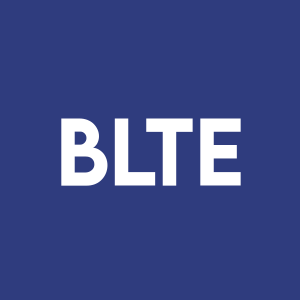Belite Bio Announces Presentation at the Association for Research in Vision and Ophthalmology 2024 Annual Meeting
Rhea-AI Summary
Belite Bio presented promising data on Tinlarebant, an oral tablet aimed at slowing disease progression in patients with retinal diseases at ARVO 2024. The Phase 2 trial showed a significant reduction in atrophic lesion growth in STGD1 patients compared to standard treatment. Enrollment for Phase 3 trials is complete, with interim data expected in Q4 2024.
Positive
Promising Phase 2 trial data showing lower atrophic lesion growth in STGD1 patients treated with Tinlarebant compared to standard treatment
42% of Tinlarebant-treated subjects did not develop atrophic retinal lesions during the 24-month treatment period
Completion of enrollment for the pivotal global Phase 3 trial of Tinlarebant in STGD1 subjects
Negative
No information provided on potential side effects or adverse events related to Tinlarebant treatment
Interim data for Phase 3 trial expected in Q4 2024, which may impact investor sentiment until full trial results are available
News Market Reaction
On the day this news was published, BLTE gained 0.20%, reflecting a mild positive market reaction.
Data tracked by StockTitan Argus on the day of publication.
- Tinlarebant is Belite Bio’s orally administered tablet intended to slow disease progression in patients affected with Stargardt Disease (STGD1) and Geographic Atrophy (GA) in advanced Dry Age-related Macular Degeneration (Dry AMD)
- Data from a 24-month Phase 2 trial in adolescent STGD1 subjects showed a sustained lower atrophic lesion growth in Tinlarebant-treated subjects compared to ProgStar participants possessing similar baseline characteristics (aged ≤18 years) (p<0.001)
- In the Phase 2 trial,
42% of Tinlarebant-treated subjects (5 out of 12) did not develop atrophic retinal lesions during the 24-month treatment period - Enrollment of a pivotal global Phase 3 trial of Tinlarebant in adolescent STGD1 subjects (“DRAGON”) has been completed with 104 subjects across 11 countries with interim data expected in 4Q 2024
- A Phase 2/3 trial in adolescent STGD1 (“DRAGON II”) and a global Phase 3 trial in GA (“PHOENIX”) are ongoing
SAN DIEGO, May 01, 2024 (GLOBE NEWSWIRE) -- Belite Bio, Inc (NASDAQ: BLTE) (“Belite Bio” or the “Company”), a clinical-stage biopharmaceutical drug development company focused on advancing novel therapeutics targeting degenerative retinal diseases that have significant unmet medical needs, today announced the presentation at Association for Research in Vision and Ophthalmology Annual Meeting (ARVO 2024) being held May 5 – 9, 2024, in Seattle, WA.
Details of the presentation are as follows:
- Presentation Number: 1026
- Presentation Title: Safety, Tolerability, and Efficacy of Tinlarebant from the 24-Month Phase 2 study in Adolescent Patients Affected by Stargardt Disease
- Session Date/Start Time: May 5, 2024 from 3:45 PM to 4:00 PM PT
- Location: Tahoma 3 (Seattle Convention Center - Arch Building)
- Presenting Author: Dr. John Grigg, MBBS
About Tinlarebant (a/k/a LBS-008)
Tinlarebant is a novel oral therapy that is intended to reduce the accumulation of vitamin A-based toxins (known as bisretinoids) that cause retinal disease in STGD1 and also contribute to disease progression in GA, or advanced Dry AMD. Bisretinoids are by-products of the visual cycle, which is dependent on the supply of vitamin A (retinol) to the eye. Tinlarebant works by reducing and maintaining levels of serum retinol binding protein 4 (RBP4), the sole carrier protein for retinol transport from the liver to the eye. By modulating the amount of retinol entering the eye, Tinlarebant reduces the formation of bisretinoids. Tinlarebant has been granted Fast Track Designation and Rare Pediatric Disease designation in the U.S., and Orphan Drug Designation in the U.S. Europe, and Japan for the treatment of STGD1.
Stargardt Disease (STGD1)
STGD1 is the most common inherited retinal dystrophy (causing blurring or loss of central vision) in both adults and children. The disease is caused by mutations in a retina-specific gene (ABCA4), which results in progressive accumulation of bisretinoids leading to retinal cell death and progressive loss of central vision. The fluorescent properties of bisretinoids and the development of retinal imaging systems have helped ophthalmologists identify and monitor disease progression. Currently, there are no FDA approved treatments for STGD1.
Importantly, STGD1 and GA, or advanced Dry AMD, share a similar pathophysiology, which is characterized by the excessive accumulation of bisretinoids, retinal cell death, and progressive loss of vision. Vision loss occurs slowly, despite peripheral expansion of “dead retina,” until the disease reaches the center of the eye (the macula). Therefore, Belite Bio is evaluating safety and efficacy of Tinlarebant in GA patients in a 2-year Phase 3 study (PHOENIX).
GA in advanced Dry Age-related Macular Degeneration (Dry AMD)
Dry AMD is a leading cause of vision loss in older adults. Geographic Atrophy, or GA, is the advanced stage of AMD. Currently, there are no FDA approved orally administered treatments for GA and no FDA approved therapies for the other stages of Dry AMD other than GA. There are an estimated 20 million AMD patients in the U.S. and over 196 million patients worldwide with an estimated global direct healthcare cost of US
About Belite Bio
Belite Bio is a clinical-stage biopharmaceutical drug development company focused on advancing novel therapeutics targeting retinal degenerative eye diseases which have significant unmet medical needs such as (i) atrophic age-related macular degeneration (AMD), commonly known as Geographic Atrophy (GA) in advanced dry AMD, and (ii) autosomal recessive Stargardt disease type 1, or STGD1, in addition to specific metabolic diseases. For more information, follow us on Twitter, Instagram, LinkedIn, Facebook or visit us at www.belitebio.com.
Important Cautions Regarding Forward Looking Statements
This press release contains forward-looking statements about future expectations and plans, as well as other statements regarding matters that are not historical facts. These statements include but are not limited to statements regarding the potential implications of clinical data for patients, and Belite Bio’s advancement of, and anticipated preclinical activities, clinical development, regulatory milestones, and commercialization of its product candidates, and any other statements containing the words “expect”, “hope” and similar expressions. Actual results may differ materially from those indicated in the forward-looking statements as a result of various important factors, including but not limited to Belite Bio’s ability to demonstrate the safety and efficacy of its drug candidates; the clinical results for its drug candidates, which may not support further development or regulatory approval; the timing to complete relevant clinical trials and/or to receive the interim/final data of such clinical trials; the content and timing of decisions made by the relevant regulatory authorities regarding regulatory approval of Belite Bio’s drug candidates; the potential efficacy of Tinlarebant, as well as those risks more fully discussed in the “Risk Factors” section in Belite Bio’s filings with the U.S. Securities and Exchange Commission. All forward-looking statements are based on information currently available to Belite Bio, and Belite Bio undertakes no obligation to publicly update or revise any forward-looking statements, whether as a result of new information, future events or otherwise, except as may be required by law.
Media and Investor Relations Contact:
Jennifer Wu /ir@belitebio.com
Julie Fallon / belite@argotpartners.com

FAQ
What is Tinlarebant?
Tinlarebant is Belite Bio's orally administered tablet designed to slow disease progression in patients with retinal diseases like STGD1 and GA in advanced Dry AMD.
What were the results of the Phase 2 trial for Tinlarebant?
The Phase 2 trial showed a significant reduction in atrophic lesion growth in STGD1 patients treated with Tinlarebant compared to ProgStar participants. 42% of Tinlarebant-treated subjects did not develop atrophic retinal lesions during the 24-month treatment period.
What trials are currently ongoing for Tinlarebant?
Belite Bio has completed enrollment for the pivotal global Phase 3 trial of Tinlarebant in STGD1 subjects ('DRAGON'). They are also conducting a Phase 2/3 trial in adolescent STGD1 ('DRAGON II') and a global Phase 3 trial in GA ('PHOENIX').
When can we expect interim data for the Phase 3 trial?
Interim data for the Phase 3 trial of Tinlarebant in STGD1 subjects is expected in Q4 2024.







